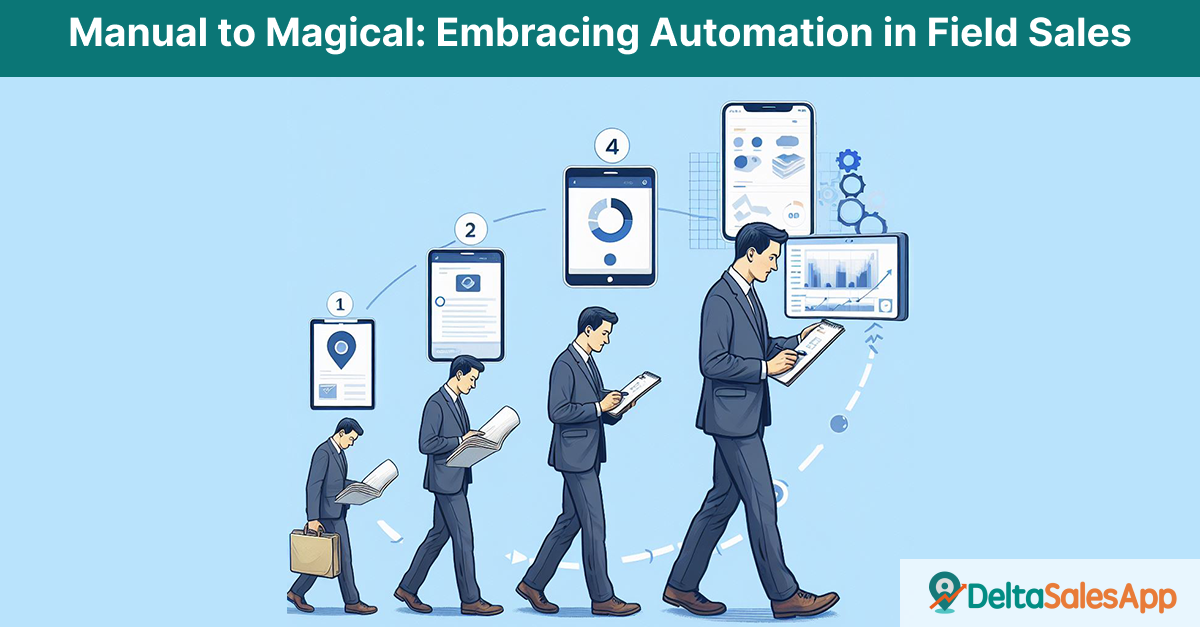Manual To Magical: Embracing Automation In Field Sales

The advent of automation has forever changed the landscape of field sales. Gone are the days of relentless paperwork and manual data entry; the future of sales is a boldly efficient, sophisticated dance of digital tools and streamlined processes. In this post, we will explore the impact of automation on the field sales industry, uncover the benefits it brings, and offer insights into how sales professionals can harness the full potential of this burgeoning technology.
The Rise of Automation in Field Sales
With the influence of digital technologies seeping into every nook and cranny of the business world, it comes as no surprise that field sales has also succumbed to the irresistible pull of automation. By automating arduous tasks such as report generation, customer data management, and scheduling, sales representatives are liberated to focus on what they do best—selling.
The Power of Data
Data has become the lifeblood of modern sales strategies. Automation tools are adept at not only collecting vast amounts of data but also at parsing and analyzing it to reveal invaluable insights. In a world where knowledge is power, data-driven decision-making is no longer a luxury but a necessity.
Enhanced customer experiences
In the realm of field sales, creating meaningful customer experiences is paramount. Automation has a key role to play in this by ensuring that the latest customer information is readily available, personalized interactions are consistent, and customer touchpoints are maximized.
Benefits of Automating Field Sales
The benefits of automation in field sales are multifaceted, delivering ROI in both tangible and intangible ways. Here are several advantages automation brings to the table:
Improved Efficiency
Automation tools can perform tasks at a speed and scale that humans simply cannot match. By leveraging these tools, sales teams can significantly increase their overall efficiency, allowing them to accomplish more in less time.
Time Savings
One of the most apparent benefits of automation is the time it saves. By cutting down on manual tasks, sales professionals have more time to focus on building relationships and closing deals, which ultimately drives revenue.
Reduction of Errors
Humans are prone to errors, but automation systems are designed to be accurate to the smallest decimal. By eliminating or reducing the occurrence of mistakes in sales processes, businesses can ensure the integrity of their data and reports.
Strategic Insights
With automation handling the day-to-day minutiae, sales leaders can step back and focus on crafting strategic approaches based on insights gleaned from the automated systems. This translates to more informed decision-making and a competitive edge in the market.
Cost Savings
By replacing labor-intensive processes with automated ones, companies not only save time but also decrease their operational costs, leading to improved profitability and potential reinvestment in growth-centric areas.
Overcoming the Challenges of Automation
While the benefits are plentiful, the road to a fully automated sales force is not without its bumps. Sales professionals may face a variety of challenges when adopting automation, such as:
Resistance to Change
In any industry, there will be individuals resistant to change, and sales is no exception. To successfully implement automation, it is critical to address this resistance head-on and clearly communicate the benefits of such technology.
The Human Touch Dilemma
There is a genuine concern that automation may strip sales of their personal, human touch. To overcome this, businesses must ensure that automation complements human efforts rather than replaces them, serving to enhance the customer experience rather than diminish it.
Integration Hiccups
One of the most common challenges reported with automation is the integration with existing systems. It is vital to choose solutions that seamlessly integrate with current software and processes to avoid disruptions.
How to Leverage Automation for Field Sales Success?
For those ready to lead the automation charge, success is within reach. Here are some strategies to effectively leverage automation in field sales:
Choose the right tools.
The success of an automation strategy hinges on the selection of the right tools. Take the time to research and identify solutions that address the specific needs and challenges of your sales operation.
Prioritize training and support.
Once the tools are in place, ensuring that your team is well-equipped to use them is paramount. Provide comprehensive training and ongoing support to help sales professionals adapt to the new way of working.
Start small and scale up.
Implementing automation does not have to be an all-or-nothing endeavor. Start with one or a few processes, observe the impact, and gradually scale up as your team becomes more comfortable with the technology.
Foster a culture of innovation.
Encourage a culture of innovation where team members feel empowered to suggest and experiment with new ways of utilizing automation to improve sales performance.
Measure and optimize
Regularly measure the impact of your automation efforts and use the data collected to optimize processes further. Continuous improvement is essential to realizing the full potential of automation.
The Future of Field Sales
The march toward full automation in field sales is inevitable. Those who adapt and harness the power of these new technologies will enjoy competitive advantages that were once the stuff of science fiction. With the right approach, automation can transform field sales from a manual, labor-intensive process into a magical, data-driven enterprise that is as efficient as it is effective.
In conclusion, automation in field sales is not about replacing the human element; it is about augmenting it. By offloading repetitive tasks to intelligent systems, sales professionals can direct their focus toward building stronger customer relationships and closing more deals. The transformation from a manual to a magical sales process is well underway, and those who embrace it stand poised to redefine the future of sales.
FAQs
Q: What are the biggest benefits of automation in field sales?
A: Automation frees up reps' time by handling repetitive tasks like data entry and reporting. It also provides valuable customer insights and helps streamline processes, leading to improved efficiency, reduced errors, and cost savings.
Q: How does automation impact the customer experience?
A: Automation ensures reps have access to the latest customer data, enabling personalized interactions and maximizing touchpoints. This translates to a more positive customer experience.
Q: Are there any challenges associated with adopting automation in field sales?
A: Challenges include overcoming resistance to change, ensuring a human touch remains, and avoiding integration hiccups with existing systems.
Q: How can we successfully leverage automation for field sales success?
A: Choose the right tools, prioritize training and support, start small and scale up, foster a culture of innovation, and continuously measure and optimize your automation efforts.
Q: Does automation replace salespeople?
A: No, automation complements human efforts. It frees up reps' time to focus on building relationships and closing deals while ensuring tasks are completed accurately and efficiently.
Q: What's the future of automation in field sales?
A: Automation is transforming field sales from a manual process into a data-driven one. Businesses that embrace automation will gain a competitive edge.









